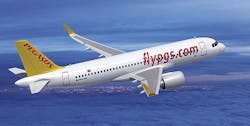Turkish carrier Pegasus Airlines orders as many as 100 Airbus A320neo fuel-efficient single-aisle passenger jets
ISTANBUL, 23 Dec. 2012. Turkish air carrier Pegasus Airlines in Istanbul has signed for as many as 100 Airbus A320neo family single-aisle jetliners -- 57 A320neo and 18 A321neo models -- of which 75 are firm orders, Airbus announced last week. Pegasus becomes a new Airbus customer and the first Turkish airline to order the A320neo.
The order by Pegasus, the second largest airline in Turkey, is the largest single commercial aircraft order ever placed by an airline in Turkey, Airbus officials say.
The new Pegasus aircraft will be configured in an all-economy layout with 180 seats in the A320neo and 220 seats in the A321neo. They will be deployed on the Pegasus network from Istanbul to destinations in Turkey, Europe, and the Middle East.
Incorporating new engines and large Sharklet wing tips, the A320neo family will deliver fuel savings of 15 percent, Airbus officials say. The reduction in fuel burn is equivalent to 369,841 gallons of jet fuel, saving 3,600 tonnes of C02 per aircraft per year.
In addition, the A320neo family will provide a double-digit reduction in NOx emissions and reduced engine noise, Airbus officials say.
The Airbus A320neo is the latest version of the Toulouse, France-based Airbus venerable A320 family of single-aisle narrow-body commercial airliners. The A320neo, which stands for new engine option, features modern fuel-efficient engines and upturned winglets, which Airbus calls "sharklets," to make the most of aerodynamic efficiency.
The twin-engine Airbus A320neo family, which is scheduled to enter service in 2016, consists of the latest-model A320, A321, and A319. All the new aircraft have sharklet wing tips and offer a choice of the CFM International LEAP-X or the Pratt & Whitney PW1100G PurePower engines. These environmentally friendly engines provide the aircraft family with some of the best fuel efficiency in its class, Airbus officials say.
The aerodynamic and engine improvements in the A320neo give the aircraft family a 15 per cent reduction in fuel consumption compared with earlier versions, as well as two tonnes of additional payload, as much as 500 nautical miles of more range, lower operating costs, and reductions in engine noise and emissions, company officials say.
Sharklets on the aircraft wingtips can add more than 3.5 percent savings in overall fuel consumption on long routes, while also improving takeoff performance and increasing payload by 1,100 pounds for additional range or more passengers.
The A320neo can seat as many as 150 passengers in a two-class arrangement, and as many as 180 passengers with high-density seating. The stretched-fuselage A321neo can seat as many as 185 passengers in a two-class layout, or as many as 220 passengers in a high-density cabin. The shorter-fuselage A319neo can seat 124 passengers in two classes or as many as 156 passengers in a high-density cabin setup.
For more information contact Pegasus Airlines online at www.flypgs.com, or Airbus at www.airbus.com.
About the Author
John Keller
Editor-in-Chief
John Keller is the Editor-in-Chief, Military & Aerospace Electronics Magazine--provides extensive coverage and analysis of enabling electronics and optoelectronic technologies in military, space and commercial aviation applications. John has been a member of the Military & Aerospace Electronics staff since 1989 and chief editor since 1995.
